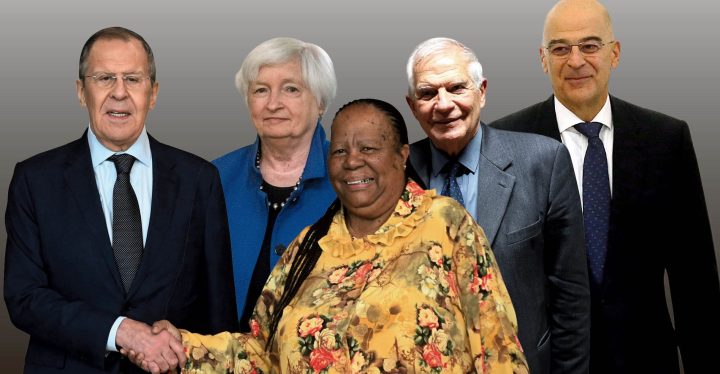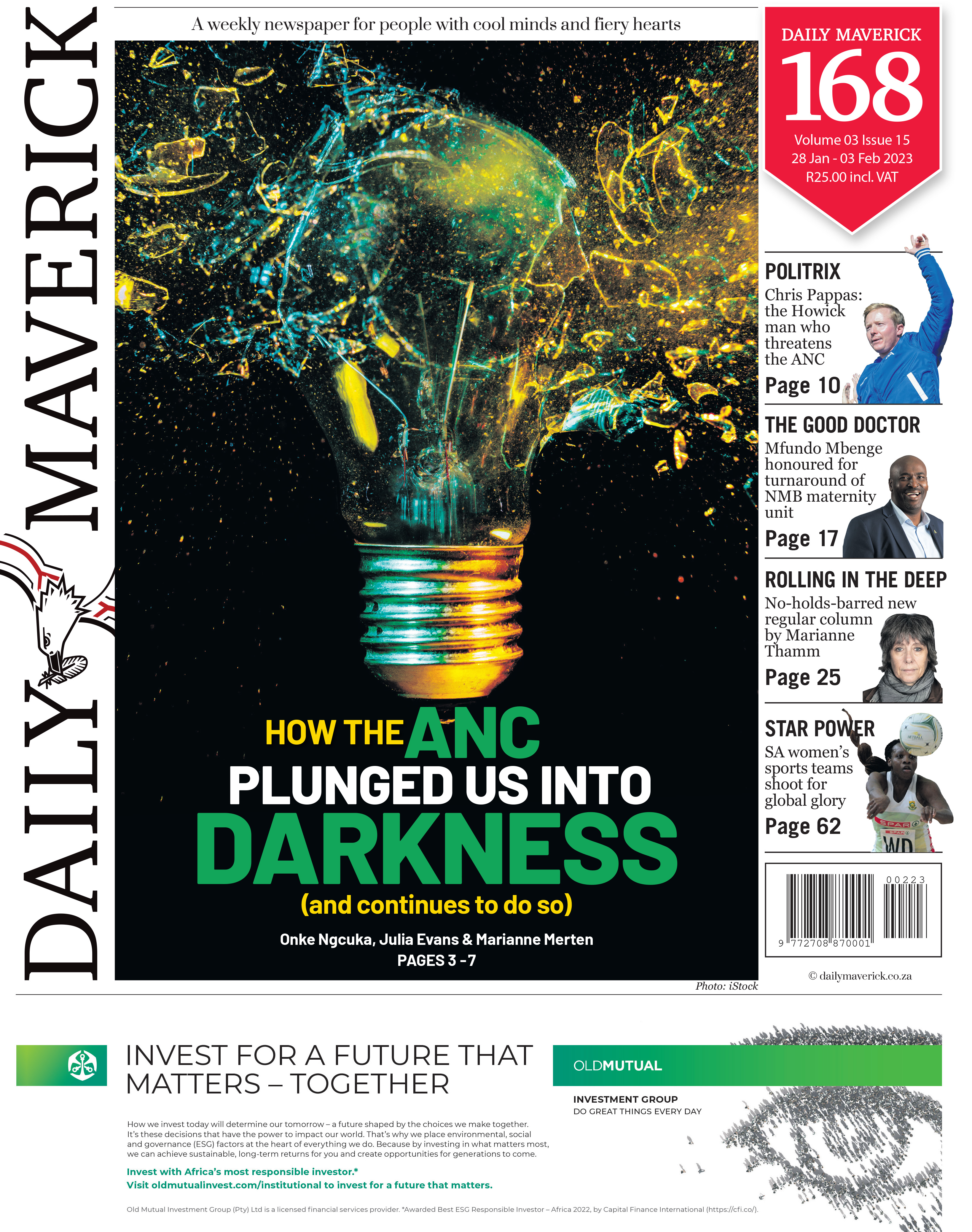TAKING SIDES
Diplomatic manoeuvres in South Africa amid the dark of a deadly war

A controversial position on Russia’s invasion of Ukraine seems to be the magnet drawing foreign luminaries to Pretoria. For how long can South Africa continue to play both sides?
A diverse drove of diplomats descended on South Africa this past week. From the East, Russia Foreign Minister Sergey Lavrov; from the West, US Treasury Secretary Janet Yellen, EU Foreign Minister and Vice-President Josep Borrell and Greek Foreign Minister Nikolaos Dendias.
Meanwhile, Minister of International Relations and Cooperation Naledi Pandor’s director-general Zane Dangor visited Palestine.
Why this sudden flurry of diplomacy? A bit of a coincidence perhaps. Borrell, for instance, was here for the 15th South Africa-EU Ministerial Political Dialogue, which was arranged some time ago. Dendias’s visit was for the same reason.
War in Ukraine
But undoubtedly Russia’s war in Ukraine was also a factor. It is very unlikely Lavrov would have been here if he were not on the first leg of an African charm offensive which then took him to Eswatini, Angola and Eritrea.
And probably Yellen’s visit wouldn’t have happened either without the war. She was also on an African safari which had taken her to Senegal and Zambia. US Treasury Secretaries usually stay at home to babysit the domestic economy or to attend big international financial meetings of the International Monetary Fund, the G7 and so on. But the US government explained the woman holding the purse strings was venturing into Africa to advance agreements reached at President Joe Biden’s US Africa summit in December.
That was in itself in part a Ukraine-inspired event. More explicitly, Washington added that “during her travel, the Secretary will also underscore the spillover effects of Russia’s illegal war in Ukraine, which have disproportionately hurt developing countries in Africa and globally”.
Yellen’s focus was on the war’s aggravation of food insecurity and its inflation of global energy prices.
South Africa’s refusal to condemn Russia’s aggression against Ukraine seems, ironically, to be the diplomatic magnet. That stance has pleased Moscow and greatly displeased the West. The latter grew even more irritated this week when Pandor made clear that, let alone condemning the invasion, she had not even asked Lavrov for Russia to withdraw from Ukraine.
That was a regression even in South Africa’s position. On 24 February 2022, hours after Russian tanks and planes crossed the border, Pandor’s department had demanded that Russia “immediately withdraw” its forces and respect Ukraine’s sovereignty and territorial integrity.
‘Simplistic and infantile’
But this week she said she had not repeated that call to Lavrov, as it would have been “simplistic and infantile” to do so, given the vastly changed circumstances now, by which she meant the massive transfer of arms and the rise in the level of conflict.
This argument seemed spurious. Pretoria’s “balanced” position as Lavrov approvingly called it, or “non-aligned” position as Pretoria prefers to call it, seems to be tilting towards Russia.
And as the various Desmond Tutu foundations and others have pointed out, South Africa’s insensitive hosting of the joint naval exercise Mosi 2 with Russia and China next month, on the very anniversary of Russia’s invasion, also indicates a shift beyond “balance” towards helping Russia, in this case by making its military more efficient. The optics of having Russia’s state-of-the-art frigate Admiral Gorshkov, armed with hypersonic missiles which Nato apparently cannot deflect, participating in Mosi 2, seem rather perverse.
Certainly, Borrell told Daily Maverick this week he would raise with Pandor the Ukraine war and its consequences for global peace and stability, especially because Russia had violated and jeopardised the future observance of the UN rules against launching “brutal aggression” against another country.
Borrell said South Africa was, of course, free to choose its own friends. But he added, significantly, that Ukraine had exercised that same freedom of association. And for that it had been brutally attacked.
Contradictory
South Africa’s stance is also contradictory as it never stops hammering Israel for its occupation of Palestine, but remains silent as Russia inflicts far greater death and destruction on Ukraine.
Pandor, of course, conversely also accuses the US and the West of hypocrisy because she says they obsess about Ukraine and say and do nothing about Palestine.
This typical diplomatic tit-for-tat illustrates the truth of the famous (and possibly apocryphal) rejoinder uttered in the early 1940s by US President Franklin Roosevelt when quizzed about America’s friendship with the brutal Nicaraguan dictator Anastasio Somoza. “Sure, he’s a son of a bitch, but he’s our son of a bitch.”
Putin, it seems, is South Africa’s son of a bitch.
But if it’s obvious then that the EU, the US and pretty much the rest of the West are greatly irritated with South Africa’s stance on the war, does it matter? Many commentators have warned that South Africa is jeopardising its friendships with the US and the wider West.
Others warn that it is suicidal madness for Pretoria to tilt like this towards Russia when it has far more substantial economic ties with and interests in the West.
Playing both sides
But this misses the point that Pretoria wants to have its cake and eat it. To maintain equally good economic and political relations with both sides. Is that overly ambitious? Perhaps. Yet, so far at least, it seems to be succeeding.
The drove of diplomats who descended this week suggests South Africa is being courted by both sides precisely because of its ambivalent position on the war.
The aim apparently is to ensure South Africa does not stray even further into Russia’s grim embrace. That is also true for Africa as a whole. Yellen and Lavrov both touched down here on wider African tours – and Lavrov will apparently be back next month to visit four North African countries. That is because the US and Russia would both like to tilt Africa’s ambivalent positions on the Ukraine war in their direction. And because, as the war polarises East and West again – and drags the world back into something like another Cold War – the quest for Africa’s strategic minerals, like lithium, coltan etc, for electric cars and smart weapons, becomes more urgent.
The dangers
One danger for South Africa though is that, even if pragmatic Western governments might publicly turn a blind eye to South Africa’s rather unseemly romance with Russia for geostrategic reasons, their displeasure could manifest indirectly and indiscernibly when South Africa really needs their diplomatic support. Another danger is that Western investors might be less indulgent than their governments. Perhaps, even as we speak, potential Western investment is diverting elsewhere.
Another risk is that having mounted the Russian bear – and the Chinese tiger – by joining BRICS back in 2011 and because of shared ideological dispositions, South Africa might find the ride gets even rougher.
What if Russia decides to deploy nuclear weapons against Ukraine, as it has threatened to do? What if the war expands to include direct confrontation between Nato and Russia and not only by proxy as now?
And what if China invades Taiwan, as it looks increasingly likely to do? Will little South Africa stay on for the rodeo? And, if so, will the West continue to indulge it?
Ultimately though, South Africa should be guided in its position on Russia’s aggression against Ukraine by its own values, forged in part by its own liberation struggle, and not by any consideration of how its stance will go down with others.
As the Tutu foundations reminded us this week, the man who inspired their establishment and who surely remains, even in death, the conscience of the nation, once said: “If you are neutral in situations of injustice, you have chosen the side of the oppressor.” DM
This story first appeared in our weekly Daily Maverick 168 newspaper, which is available countrywide for R25.


















 Become an Insider
Become an Insider
Comments - Please login in order to comment.